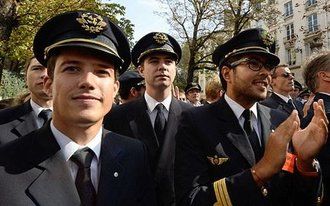After two weeks and hundreds of millions of euros in losses, Air France pilots have called off their strike, and with no deal signed. SNPL, the pilot’s union, has yet to reach an agreement regarding the airline’s plans to expand Transavia, its low-cost subsidiary.
The 14-day pilot strike meant the airline had to cancel over half its flights and incur losses of about €20 million ($25.4 million) per day.
According to SNPL (Syndicat National des Pilotes de Ligne), the strike was ending so negotiations could continue in a better and calmer climate.
In order to compete with low-cost carriers, Air France says it has to cut costs.
On its website on Sunday, Air France wrote:
“The Company deeply regrets that despite lengthy negotiations since the beginning of the conflict (including 15 hours yesterday), enabling much progress to be made, the balanced and reasonable protocol to end the conflict proposed by Management has not been signed by the unions. Air France regrets that the pilots’ unions have not seized these opportunities.”
This was the longest pilot strike in Air France’s history.
Committed to expanding Transavia
The airline reiterated its commitment to developing Transavia in France, something it describes as the Group’s key growth factor.
Chairman and CEO of Air France-KLM, Alexandre de Juniac, said:
“The management team, Frédéric Gagey and I are well aware of the trauma that our customers, our employees and our partners have just experienced with this long strike. Our priority is now to join forces around the Air France-KLM group’s growth and competitiveness project, Perform 2020. I would like to thank all those who, in the belief that growth is within our reach if we provide ourselves with the necessary means, have supported our development projects.”
“I would also like to thank all the staff at Air France who, over the past two weeks, have done a remarkable job in extremely difficult circumstances. To all our customers and our staff, I want to express our confidence and our commitment to restore the links and regain momentum.”
Manuel Valls, France’s Prime Minister, said Air France should resume Transavia’s development in France rapidly. In a statement, Mr. Valls said “The government’s firmness has allowed the company to reaffirm its strategic development plan.”
On Friday night, Air France turned down an SNPL offer to end the strike if an independent mediator was brought in. The offer was also rejected by the French Government, which has a 16% stake in the airline.
Consequently, the company announced on Saturday that only half its scheduled Sunday flights would take off.
Today, Air France announced that flights will gradually return to normal as from Tuesday, but the cancelled flights on Saturday, Sunday and Monday would not be rescheduled.
The SNPL and Air France said they will continue negotiating the employment contracts. The pilots are not happy about the company’s plans to expand Transavia via regional hubs across Europe.
Fierce battle with low-cost airlines
Air France, along with its European rivals, is fighting a fierce battle for market share with low-budget airlines such as EasyJet and Ryanair as travelers reduce spending.
The Paris-based carrier has managed to narrow losses thanks to a three-year restructuring program that started two years ago. However, it continues making a loss. It made a net loss of €614 million in H1 2014.
The company plans to transfer most of its short-haul and some medium-haul flights to Transavia and Hop!, its two low cost carriers. Under a bargaining agreement signed in 2007, the airline must consult with pilots before adding aircraft to Transavia’s fleet. The pilots rejected the proposal.
They will only agree if all Transavia pilots get the same pay and conditions as those working for Air France.


